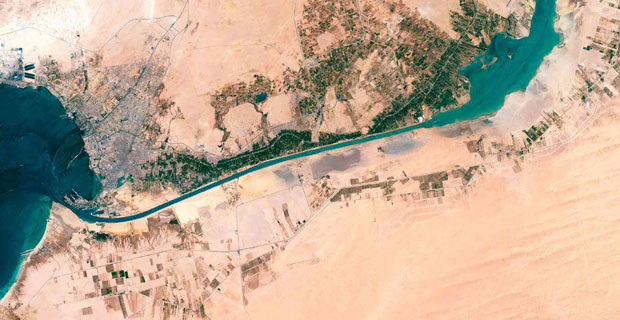Suez Canal – Maritime Opportunities for India
Researched and written by Isha Jaiswal & Dr PS Jaiswal
An analysis of the data provided on the website of SCA indicated that roughly 51 ships traversed the Canal in 2019 per day [11]. Whilst, the Wall Street Journal in one of its articles stated that an average of 40 – 50 ships daily cross the Suez Canal. [12]. It takes about 12 – 16 hours for one ship to cross the complete stretch between the Mediterranean Sea to the Red Sea. [13]. Ships carrying goods to and from India also navigate these waters.
India too will be impacted by this transit fee hike. Usually, we import raw materials and high technology finished goods through this route including luxury cars that come in semi-knocked down condition from various European manufacturing hubs. All these imports will become dearer. The cost of insuring these imports will enhance the premium outgo to be paid by the importers. This in turn will be passed on to the end consumers in India.
Our exports too will become dearer in the western markets. Therefore, the Indian manufacturers will have to tighten their belts to reduce the bottom line to absorb the enhanced freight charges in order to remain competitive. It is evident that whether India imports or exports anything through the Suez Canal, the cost of the goods sold anywhere will become dearer due to these enhanced freight charges.
In order to offset this tariff hike, Indians at the national level now need to act to offer greater services in the Suez Canal Area. Furthermore, the Indian diplomacy and the industrial sector should seek more concessions from the Suez Canal Authority (SCA) in terms of providing better value-added services that will enhance the Indian revenue or reduce the bottom lines of the cost of operations of the Suez Canal Authority. Consequently, after providing such high stakes, Indians can logically negotiate for favourable tariff rates for the Indian shipping lines in return for the financial benefit provided to the SCA.
Various avenues where the Indian entrepreneurs can add value to this aquatic trade chain, is, by providing customized operations research, artificial intelligence and data analytics-based services to earn foreign exchange and indirectly acquire controlling stakes including risk management in Suez Canal operations. This can be done by the active, in situ generation of insurance options by Indian acturists by providing an option for cargo ships to circumnavigate around the Cape of Good Hope should an accident situation like Evergiven happen again. Furthermore, our acturists and insurance companies can design Political Risk Insurance (PRI) that caters to the piracy threat which is rampant in the Arabian Sea. PRI is actually an instrument of policy offered by the insurer to the businesses to, indemnify them of losses that they may face due to the political actions of state and non-state actors. So, the piracy risk too can be covered, so that, ships do not need to carry armed gunmen onboard which has further unpleasant ramifications if, people get killed, as it happened off the coast of Kerala involving the Italian Marines.











Comments.